Review for Silent Running (Masters of Cinema)
Introduction
The Javan Rhinoceros is now extinct in Vietnam. That was the headline to a brief story printed in the Guardian newspaper a week or so ago. The story itself merely stated that a poacher had killed the last known specimen for its horn (what else?), and that elsewhere, only 30 individuals were accounted for in the wild, making this one of the most endangered species of mammal in the world. It's always the tiny little stories tucked away on page seven of the broadsheets these days, where no one bothers to read them, the continuing destruction of the rainforests, climate change, pollution, the melting of the ice caps, and more and more species hurtling to extinction, like the various sub species of tiger, Chinese river dolphins, gorillas… It should be front-page headline news, a crime akin to genocide, that humanity has yet again irrevocably destroyed another part of the natural world. But it's become part of the norm, the way of things, it's rapidly becoming invisible. Back in 1971, Silent Running was simply that 'hippy sci-fi' movie. But with each passing year, it becomes more and more a prescient warning that too many of us, and more importantly too many of the people in positions of power choose to ignore. Now that Masters of Cinema are sprucing it up and giving us its high definition debut, maybe we rabid consumers who lavish our affections on the latest gadgets, the big screen TVs and home cinema systems, will pay attention…
In an unspecified future, the natural world has finally been eradicated, destroyed by a humanity that no longer needs growing stuff to survive, whether it is for food or for oxygen. But a guilt afflicted society has decided to preserve as much of the natural world as is possible, which in this case means launching samples of flora and fauna into space, nurtured amidst large geodesic domes carried aboard massive freighters. For Freeman Lowell aboard the Valley Forge, it's his sworn duty, his one true calling, and the one place he feels truly at home. For his three crewmates, it's a dead end job in the hind end of space. Lowell has been campaigning for the reestablishment of the Parks and Forests system on Earth, but when the call comes in, it's an order for the freighters to return to their normal duties, for the mission to be abandoned, for the domes to be jettisoned and destroyed. His crewmates may be jubilant, but that's the one thing that Freeman Lowell will not allow.
Picture
The 1.85:1 widescreen 1080p transfer on this disc looks pristine. It's absent of any print damage or cine wobble, and you can read in the accompanying booklet the journey it's had from interpositive, via restoration to this disc. That said, you shouldn't expect modern blockbuster levels of clarity and pop on this disc. This is after all a 40-year-old low budget, practically independent film. The film looks a little flat at times, there is a significant but constant level of film grain, and blacks in certain scenes, especially effects sequences, do tend to be uneven, no doubt because of the front-projection techniques used to get all the effects in camera. But in the brighter scenes, colours are strong and vivid, and detail levels are high. You can read all of the badges on Lowell's uniform, and see the detail in the cloth texture. The effects work still holds up well today, mostly because as mentioned, it's in camera, while shooting the interior sequences on the decommissioned Valley Forge aircraft carrier gives the film an epic scope.
The images in this review are sourced from the press release, and aren't necessarily representative of the final retail release.
Sound
The audio for Silent Running is the original mono format, presented here as a DTS-HD MA 2.0 English audio track. As you can imagine, it's a front focussed affair, with little in terms of space to it, but the clarity is excellent, there's no distortion or drop outs, and the film sounds fantastic given its constraints. Then there is that hauntingly memorable Joan Baez theme song…
English SDH subtitles are provided should you require them.
Extras
As always, Masters of Cinema come up trumps when it comes to extra features, although those of you who have previously imported the Silent Running special edition from the US will find the on disc features familiar. They are making their UK debut here though.
On the day of release, purchasers will find a lush, 48-page booklet to accompany the film tucked away in the case, or the Limited Edition Steelbook. Thanks to Eureka Entertainment, I had a sneak peek at a pdf file that reveals what will be in the final print document, although I can't comment on print or binding quality. It's loaded with production art, stills, behind the scenes photographs, and also offers an introductory comment written in 1972 from director of photography Charles Wheeler, a brief 2002 interview with the film's composer Peter Schickele, and a comprehensive recounting of the film's production from Wayne Smith, credited for Special Designs, again writing in 1972. Eureka films have also included documentation on the background of the Blu-ray transfer.
The disc gets animated menus, while top of the extras list is the audio commentary, recorded in 2000, with Douglas Trumbull and Bruce Dern talking about the film. It happens rarely enough with my limited time, but Silent Running is one of the few films that I watched back to back, twice in a row, partaking of the commentary immediately after the film. It's an excellent track with both speakers contributing much to the background of the film, the making of, and offering some nice anecdotes. It's well worth listening to.
You also have the option to watch the film through with just the music and effects track playing, although my time was limited enough to preclude me watching it a third time in one night.
The Making of Silent Running is a documentary that was made in 1972 by Charles Barbee. It lasts 50 minutes and is a rare, contemporary look at the making of a feature film back in the 70s, long before it became de rigueur to create EPK supplements for DVDs. It's a straightforward documentary as the film follows the production of the movie, taking us behind the scenes on the Valley Forge aircraft carrier, and with interviews with the cast and the crew.
There are a couple of interviews recorded in 2001 with director Douglas Trumbull here, Silent Running by Douglas Trumbull lasts 30 minutes as he recounts the making of the film. Some of the comments here are recognisable from the audio commentary. There is also a 5-minute look at his subsequent career in Douglas Trumbull: Then and Now.
A Conversation With Bruce Dern, also recorded in 2001 lasts 11 minutes and the actor talks about his experiences on the movie.
Finally the original theatrical trailer is here, lasting 3 minutes. All of the extra features aside from the commentary and the isolated music and effects score are presented in NTSC SD format.
Conclusion
Silent Running was the first film that made me cry for an abstract, an idea. I must have been five or six years old when I first saw it, flush with Star Wars fever, and eager to lap up anything to do with space, or with robots. What I wasn't expecting was Silent Running's thoughtful, eco-message, the story that branded it that 'hippy sci-fi' movie back in the seventies. Up until that point, scary things on TV and in movies made me cry, and obviously sad things made me cry, but this was the first time that I ever had any sort of empathy for a machine. Machines were the bad guys, the Daleks and the Cybermen, and all of a sudden I have my heart in my mouth when Huey gets 'injured', and I have tears in my eyes when I think of Dewey, the eternal custodian of Earth's last scrap of nature, eternally drifting through the cosmos. But what made me bawl my eyes out, and run for the comfort of my mother, was the idea that Silent Running implied, but never showed. It was the thought of a homogenised, mechanised Earth, where nature had been eradicated, where no plants grew, no animals lived, just man and machine that just broke my heart, and I needed the reassurance that this was just a movie, that it wouldn't really happen, to calm me down again.
This was the late seventies though, humanity was still riding the coattails of Apollo's achievement, there was no climate change, acid rain hadn't been invented, no ozone hole, and there were only 4 billion people on the planet. Yes we could screw things up, but we could fix them as well, nothing was impossible, after all, the condor had just been reintroduced to California.
Now, more than 30 years later, I'm older, more cynical, more jaded, and less likely to empathise with an ambulatory electronic trashcan. I find that Silent Running is more relevant than ever before. It's gone from being a piece of speculative fiction, a fanciful what if 'hippy sci-fi', to being a prescient warning on the folly of mankind. Its bleak and nihilistic future is becoming more and more likely with each passing decade as it becomes blatantly apparent that humanity is not in control of his environment, that we don't have all the answers, and that we fool ourselves into thinking we do. What's worse is that while we follow the course towards the bleak future outlined in Silent Running, that of over population, mass extinction, and habitat loss, we have none of the technologies or contingencies to deal with these situations. In Silent Running, the Earth may have lost its natural environments, but there are the technologies to feed every man, woman and child with synthetically produced food. We still need our food to come out of the ground. They have control of the environment to a degree where there is a shirtsleeve environment across the globe, and obviously they no longer need plants and photosynthesis for the air that they breathe. They also have a functioning space travel industry, and the ability to launch biodomes into space to preserve what nature they can. We have nowhere near that ability, although scientists have now established seed-banks in the Arctic Circle, where they collect samples of the world's plant life to preserve for future generations. This is the same Arctic Circle that will be free of ice due to global warming by the end of the century.
The movie's message aside (for it is the least of its attributes), Silent Running is a tremendous achievement, a sci-fi movie made for the relatively paltry sum of $1.3 million. It's a thoughtful, contemplative adventure thriller movie, with a grand scope, engaging ideas, and more importantly a gripping story and a very interesting central character. What astounds me is that Freeman Lowell is no hero; he's not even an anti-hero. He's a thoroughly dislikeable individual whose journey and adversity transforms him into that which he wishes to be. When we first encounter him, swimming in a pond, and then benevolently feeding a rabbit, gathering fresh fruit and vegetables from his garden, he's wearing homespun robes, a monastic, even ascetic figure, at one with nature and almost saintly.
That's until we meet his crewmates, in their synthetic uniforms, eating synthetic food, and living synthetic lives. They're just doing a job, would much rather be at home, and don't even care about the last remnants of nature that they are supposed to protect. In his interactions with them we learn the reality of Freeman Lowell, aloof, superior, isolated and proselytising. He's a true believer, a zealot, a fundamentalist, and the only thing worse than a fundamentalist, is a fundamentalist who is actually right. He's assured that his mission is intrinsically right, that his opinion, his expertise is indispensable, and he's certain that he'll be called upon to serve in a higher capacity.
The shock when the reverse happens, his employers decide to abandon the project and consign the natural world to history is devastating, and he reacts almost instinctively to protect the garden that has been left in his care. He does so in the most monstrous way possible, by committing murder, and that act serves to haunt him from then on. He now has to take the ship and flee, to hide from everyone searching for him and to run silent. He also still has to tend the garden in his care, but the act of taking the ship left him injured, with no one else aboard to treat his wounds. He has to reprogram the ship's maintenance drones to become surgeons, and by doing so he takes his first step towards redemption.
The aloof, righteous and independent zealot has to depend on another entity to take care of him, and whereas he couldn't interact with his crewmates, the maintenance drones become his companions, his friends, and his one way of keeping a hold on his sanity, isolated as he is hundreds of millions of miles away from any other living human. He anthropomorphises the drones, gives them names, expands their programming, and teaches them everything he knows about tending nature. As the voyage continues, and he faces the challenges that they encounter, he begins to realise the value of another's existence, and the burden of his previous actions weigh on him more and more. Ultimately he's faced with the choice of his former pride and righteousness, or truly protecting the nature that he cherishes by sacrificing his pride, and himself. By the end of the film, he's truly become the man that he was projecting himself as. It's a wonderful, emotional character journey, and a great performance that carries the film.
Silent Running has aged well, although there is a part of me that wishes that it weren't so. I'd much rather that this film was less relevant than more; that we lived in a world where its grim, apocalyptic message was a fanciful piece of imagination, rather than the ultimate destination of the path that the world currently appears to be on. Hopefully this Blu-ray release will inspire a new generation of 'hippies' to do something about it. Eureka Films and Masters of Cinema have given this film a stellar treatment, and the film has never looked so good.
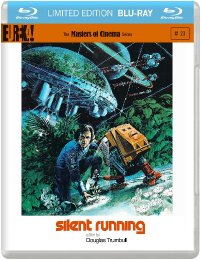
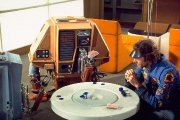
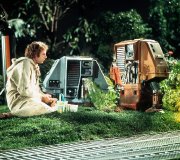
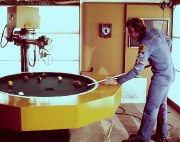
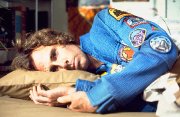
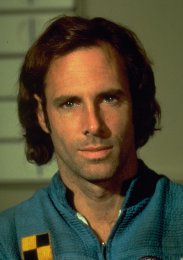





































Your Opinions and Comments
I think last year (or was it the year before) I decided to give it a proper go. Still found it really boring. :(
Never seen Soylent Green or The Omega Man, but one you failed to mention I do enjoy is The Andromeda Strain.
There are plenty of cult films I've seen over the years, and plenty yet to see. Some have been a disappointment, others I can appreciate considering the time they were made in, others have been great!
The drones Huey, Dewey and Louie (named for Donald Duck's nephews) are absolute little heartbreakers. While I had some slight ethical issues once about exploiting disabilities - the three drones are operated by multiple amputees Mark Persons, Steve Brown, Cheryl Sparks and Larry Whisenhunt - I have since come to the viewpoint that ultimately the performances of these actors are paramount to the power of the movie and that their disabilities actually enabled them to play the roles as conventionally able-bodied actors would not have been able to fit in the restrictive drone costumes. Bruce Dern turns in a remarkably sympathetic performance given his usual track record of the time for playing psychos, and Douglas Trumbull's effects are possibly the best pre-Star-Wars.
The movie was originally released in a double-bill with Robert Wise's adaptation of Michael Crichton's The Andromeda Strain (another movie with ethical issues). I'd have hated to have sat through that - both movies are an emotional rollercoaster. By the time the curtains closed, you'd be exiting the theatre on your knees.
Although I agree the effects in Silent Running are also pretty good. It's clearly a dividing film, as is 2001.
FWIW, 2001 is one of the few pictures I've triple-dipped on over the years - the initial DVD release, the SE and the Blu.